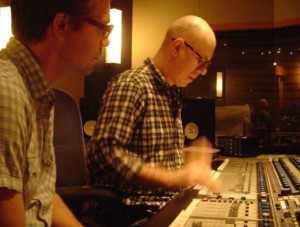Gear Talk: iPad & Studio Apps
Out today is a brand new short, where you can hear Geoff and Eli talk about inventive control surfaces, new software for mixing music on iPads, and programs that allow you to conduct remote mix sessions, whether the artist and engineer live right down the block or are halfway around the world.
Listen to the episode below, or right click here to download…
Stay tuned for new full-length episodes coming the second Wednesday of every month, with bite-sized “shorts” in between.
We’re developing and releasing the new season now, and working hard to schedule great guests like Nick Launay [Arcade Fire, Talking Heads, Gang of Four], Ian MacKaye [Fugazi, Minor Threat, Dischord Records] and David Lowrey [Cracker, Camper Van Beethoven, An Open Letter To NPR’s Emily White].
So please, enjoy and don’t forget to send in your questions and requests!
Click below to hear the episode!
Input\Output: Gear Talk – iPad & Studio Apps








Greg
August 9, 2012 at 7:56 pm (12 years ago)Great episode. You mentioned Rogue Amoeba–I too use Audio Hijack Pro for recording interviews and creating high-quality podcasts. It’s a great product from a great company. I’ve tried Airfoil, but now I’m using AirPlay, which is now integrated with Logic, Digital Performer, and other Core Audio-based software in Mac OS X Mountain Lion. (I would assume you could use it with Pro Tools 10, but I haven’t upgraded.) In Logic or DP, you just select AirPlay in the hardware menu and as the output in your computer’s system preferences and, badda-bing, you can send audio to your AirPlay-equipped stereo or TV. (There does seem to be one limitation, which is that output seems to be restricted to 44.1. Maybe I’m just missing something there. But that’s a bummer if you’ve got a 48 or 96k mix.)
I totally agree with you that this sort of capability, whether through Airfoil or AirPlay is a HUGE time saver. Even though the latency prevents me from doing real-time mixing, I can get a fast impression of how something sounds on a consumer system without having to bounce and transfer to an iPod, iTunes, or CD.
Anyway, thought I’d mention it. Thanks again for the episode. I look forward to the next one.
Anonymous
August 9, 2012 at 8:59 pm (12 years ago)Thanks for the insights!
Neither of us are on Mountain Lion yet, so speaking for myself, I was completely unaware of that new feature. It sounds great though!
Now being ProTools guys, we are also often unaware of other platforms out there.
Working in ProTools with Avid Hardware forces you to not use Core Audio so to get Airplay to work with a PT rig, and this is also the case with Airfoil, Nicecast, and Audio Hijack, you need to get back into the computer either using the digital inputs or another device like an M-Audio transit that does digital to usb/firewire. As far as I know, PT does not allow other programs to pick off its audio streams which is kind of a bummer but probably contributes to its overall stability.
One thing about AirPlay is that because its tied to the OS, and MacOS really doesn’t like much but 44.1khz, other sample rates can be a real pain in the ass to get working. Actually now that I think about it, this reminds me why I ended up with the setup I have. Because I have had issues with my configuration over exactly this issue. My best configuration has been when I use a digital to firewire or usb converter to get back into the computer rather than just going into the Mac digitally from my analog converter. This way I can completely avoid the OS having to re-clock to an incoming digital source which MacOS just does not like doing. And its easy enough for any of these programs to pick off an incoming firewire or usb digital audio feed. I would be curious as to how Airplay works in this regard though. I know it that it works with the Rogue Amoeba stuff, but I woulnd’t be as confident with Airplay.
Anyway, thanks again for writing in Greg.